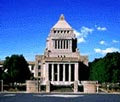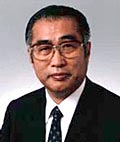 |
General
Info |
| Government
|
 |
 The
Japanese parliament came into existence in 1980 by virtue of the Meiji
Constitution. Called the Imperial Diet, it consisted of two houses: the
House of Peers and the House of Representatives. Members from the House
of Peers were chosen from members of the Imperial Family, the Peers, people
who paid high taxes, and others appointed by the Emperor. On the other
hand, members from the House of Representatives were elected by a limited
franchise. It was only after the 1925 Electoral Law that members of the
House of Representatives were chosen under the universal adult male suffrage. The
Japanese parliament came into existence in 1980 by virtue of the Meiji
Constitution. Called the Imperial Diet, it consisted of two houses: the
House of Peers and the House of Representatives. Members from the House
of Peers were chosen from members of the Imperial Family, the Peers, people
who paid high taxes, and others appointed by the Emperor. On the other
hand, members from the House of Representatives were elected by a limited
franchise. It was only after the 1925 Electoral Law that members of the
House of Representatives were chosen under the universal adult male suffrage.
 The
Meiji Constitution was based on the principle of monarchism with the Emperor's
prerogative and power of the Imperial Diet. Many efforts were made to
bring in democratic practices and the first Cabinet party only came into
existence from 1910 to 1920. It replaced the bureaucratic Cabinets of
the past. Nonetheless, the Cabinet continued to report to the Emperor
and not to the Diet. The Emperor also appointed the Prime Minister on
the recommendation of senior statesmen. The
Meiji Constitution was based on the principle of monarchism with the Emperor's
prerogative and power of the Imperial Diet. Many efforts were made to
bring in democratic practices and the first Cabinet party only came into
existence from 1910 to 1920. It replaced the bureaucratic Cabinets of
the past. Nonetheless, the Cabinet continued to report to the Emperor
and not to the Diet. The Emperor also appointed the Prime Minister on
the recommendation of senior statesmen.
The new Constitution
was declared after World War II and put into effect on May 3, 1947. The
Constitution proclaims the Emperor as the symbol of the state, thus deriving
his position from the will of the people with the sovereign power residing
in the people. The Emperor's role (as specified) would be to perform only
matters of the state as provided for in the Constitution and have no powers
relating to the government.
On the other hand,
the Imperial Diet has been replaced by the National Diet, which functions
as the highest means of state power and the sole law-making entity of
the state.
 The
National Diet is composed of two houses: the House of Representatives
and the House of Councilor. It is somewhat similar to that of the British
parliamentary system. The party in power would be the party that controls
the most seats in the Diet. This party has the right to appoint the Prime
Minister who is usually the party's president. The Prime Minister would
in turn appoint his Cabinet, which is usually constituted of the Diet
members. The Cabinet is held collectively responsible to the Diet in the
exercise of executive power. If the House of Representatives pass a vote
of non-confidence, the Cabinet is then required to resign en bloc or the
House of Representatives will be dissolved in order for an appeal to be
made directly to the country through an election. The
National Diet is composed of two houses: the House of Representatives
and the House of Councilor. It is somewhat similar to that of the British
parliamentary system. The party in power would be the party that controls
the most seats in the Diet. This party has the right to appoint the Prime
Minister who is usually the party's president. The Prime Minister would
in turn appoint his Cabinet, which is usually constituted of the Diet
members. The Cabinet is held collectively responsible to the Diet in the
exercise of executive power. If the House of Representatives pass a vote
of non-confidence, the Cabinet is then required to resign en bloc or the
House of Representatives will be dissolved in order for an appeal to be
made directly to the country through an election.
Top of Page
|
